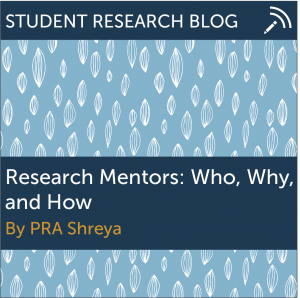 By Shreya Murthy, OUR Peer Research Ambassador
By Shreya Murthy, OUR Peer Research Ambassador
There’s no question that if you are interested in research for any reason, it is a valuable experience. However, one the most important parts of the research process is finding a research mentor. The information below will help you navigate this step.
Who Are They?
Research mentors are usually faculty members or graduate students who support you through your research journey. Mentors are there to guide you through the many ups and downs of the research process. They can and sometimes will change as you develop as a researcher and your needs and interests change. You may have more than one mentor as you move through your research endeavors.
Why Are They Important?
Mentors are your first point of contact for general research questions or concerns. They are there to be sounding boards for struggles, provide key suggestions of resources or other people to consult, and review materials as you move toward presentations of your work. They are also there to help you manage your expectations. One of the most helpful pieces of advice that my mentors continue to give me as I work on my research is that I need to be realistic about my project goals and to be careful not to bite off too much. Mentors are also great people to talk to about potential careers in your field or help with graduate school applications and planning for your future. They can suggest programs, write you recommendations, or help you find other opportunities.
How Do You Find One?
Finding a mentor is always the hardest part, as it requires a lot of effort to build that relationship. There are many ways to begin making these relationships, including going to a professor’s office hours to discuss their research and your interests or through an honors conversion project. You can also begin with an email to get help synthesizing an idea that you have. It is important to note that while having a mentor related to the field you are studying, finding one that perfectly matches with everything that you want to do is also not necessary. You want to look for a mentor who you work well with, and who can guide you through your research and future endeavors.
How Do You Maintain the Relationship?
Once you find a mentor, make sure you regularly communicate with them or meet with them. Don’t wait for something to go wrong with your project before you reach out. Send them an email or schedule a meeting. Don’t be afraid to ask questions or even ask how the mentor would prefer to communicate about your project. Be proactive!
Mentors are really amazing people who have a lot of experience that they are more than happy to share. They are great resources for your research and professional career.
Shreya is a junior majoring in Criminology, Human Rights, and Finance, with a minor in Political Science. Click here to learn more about Shreya.